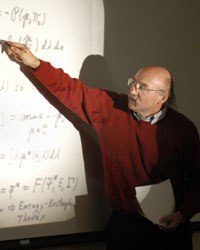
 |
Dr. Andrew J. Majda's Lectures
|
| Systematic Strategies for Stochastic Mode Reduction In Climate Monday, January 24, 3:30pm (refreshments to be served at 3:00 p.m.), in 499 Dirac Science Library |
| New Perspectives on Equilibrium Statistical Mechanics and Predicting Jupiter's Red Spot - PUBLIC LECTURE Wednesday, January 26, 4:00pm (refreshments to be served at 3:30 p.m.), in 499 Dirac Science Library |
| Information Theory and Predictability Friday, January 28, 3:30pm in 101 Love Building |
| Abstract: One of the grand challenges of contemporary science is a comprehensive predictive model for the atmosphere, ocean, and coupled climate system. This is one of the most difficult multi-scale problems in contemporary science because there is an incredible range of strongly interacting anisotropic nonlinear processes over many spatio-temporal scales. New mathematical strategies are needed to assess their impact. The theme of these lectures in the serendipity between modern applied mathematics and these complex physical phenomena. In particular, mathematical ideas from PDE's, information theory, and stochastic equations will be utilized in the mode of modern applied mathematics where rigorous theorems, quantitative, asymptotic, and numerical ideas are all blending together to attach important physical issues. Novel application of this philosophy will be presented throughout the lectures in predicting Jupiter's Red Spot (public lecture), systematic mathematical strategies for stochastic mode reduction for climate (Monday lecture) and a new mathematical framework using information theory to quantify the predictability in complex multi-scale chaotic systems. |
|
Last modified: January 16, 2005 *** Email-us |